

The Cooking, Eating, and Business of Shared Food. For conscious eaters, the dinner table is composed of thoughtfully sourced ingredients – local, organic, sustainable, etc.
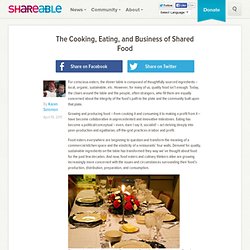
However, for many of us, quality food isn’t enough. Today, the chairs around the table and the people, often strangers, who fill them are equally concerned about the integrity of the food’s path to the plate and the community built upon that plate. Growing and producing food – from cooking it and consuming it to making a profit from it – have become collaborative in unprecedented and innovative milestones. Eating has become a political/conceptual – even, dare I say it, socialist! – act delving deeply into peer-production and egalitarian, off-the-grid practices in labor and profit.
Food eaters everywhere are beginning to question and transform the meaning of a commercial kitchen space and the elasticity of a restaurants’ four walls. Place settings on the dinner table. Communal Food Production Why toil behind a hot stove alone? Chefs at CVI's Earth to Table dinner. Top 10 Tips for Starting a Campus Food Co-op. Our friends at CoFed just launched a campaign to create ethically-sourced, cooperatively-run sustainable food storefronts and cafés on college campuses nationwide.
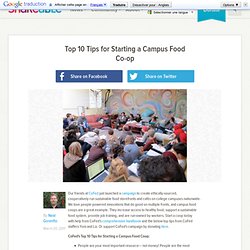
We love people-powered innovations that do good on multiple fronts, and campus food coops are a great example. They increase access to healthy food, support a sustainable food system, provide job training, and are run-owned by workers. Start a coop today with help from CoFed's comprehensive handbook and the below top tips from CoFed staffers Yoni and Liz. Or support CoFed's campaign by donating here. CoFed's Top 10 Tips for Starting a Campus Food Coop: People are your most important resource--- not money! Big thanks to Yoni and Liz of CoFed for writing these tips. CoFed regional organizers at a recent retreat. Policies for a Shareable City #12: Food Sharing. Some foods are just too good not to share, which is one reason to think about policies for food sharing.
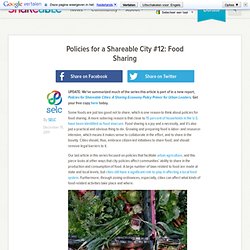
A more sobering reason is that close to 15 percent of households in the U.S. have been identified as food insecure. Food sharing is a joy and a necessity, and it’s also just a practical and obvious thing to do. Growing and preparing food is labor- and resource-intensive, which means it makes sense to collaborate in the effort, and to share in the bounty.
Cities should, thus, embrace citizen-led initiatives to share food, and should remove legal barriers to it. Our last article in this series focused on policies that facilitate urban agriculture, and this piece looks at other ways that city policies affect communities’ ability to share in the production and consumption of food. Here are some suggestions for ways that cities can adopt policies to facilitate the sharing of food: Bauwens : « Le peer-to-peer est le socialisme du XXIe siècle » Le « peer-to-peer », souvent abrégé P2P, permet par exemple d’échanger des fichiers musicaux ou des films sur Internet.
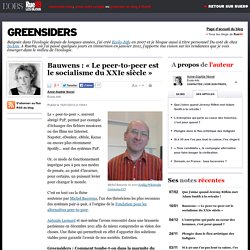
Napster, eDonkey, eMule, Kazaa ou encore plus récemment Spotify... sont des systèmes P2P. Or, ce mode de fonctionnement imprègne peu à peu nos modes de pensée, au point d’incarner, pour certains, un puissant levier pour changer le monde. C’est en tout cas la thèse soutenue par Michel Bauwens, l’un des théoriciens les plus reconnus des systèmes pair-à-pair, à l’origine de la Fondation pour les alternatives peer-to-peer. Antonin Leonard et moi-même l’avons rencontré dans une brasserie parisienne en décembre 2011 afin de mieux comprendre sa vision des choses. Une thèse qui permettrait en effet d’apporter des solutions viables pour garantir l’avenir de nos sociétés.
Greensiders : Comment tombe-t-on dans la marmite du peer-to-peer ? Le concept est un peu abscons au premier abord... pouvez-vous nous le définir simplement ? PLAYER #6. Magazine. La chose est entendue ; les phénomènes d'innovation qui se sont manifestés par les modèles issus d'Internet depuis dix ans ont transformé radicalement les dynamiques de création et de transformation des marchés, et ce, de manière probablement irréversible.
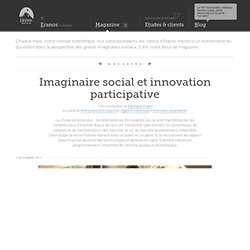
Cette étape de notre histoire marque ainsi un avant et un après. Si le mouvement est apparu d'abord sur les secteurs des technologies et services en ligne, il semble influencer progressivement l'ensemble de l'activité sociale et économique. Il n’est désormais plus un espace social qui ne soit impacté par les transformations des modèles de l’innovation — pensons au politique, avec le modèle Obama —, jusqu’à des processus d’innovation scientifiques ou industriels — crowdsourcing, RSE, wiki et autres open hardware, en passant par les fonctions marketing ou RH, qui vont ménager une place au consommateur/collaborateur comme elles ne l’ont probablement jamais fait. Panorama. Vous êtes le media Le consommateur souverain. Consommation collaborative. La consommation collaborative.